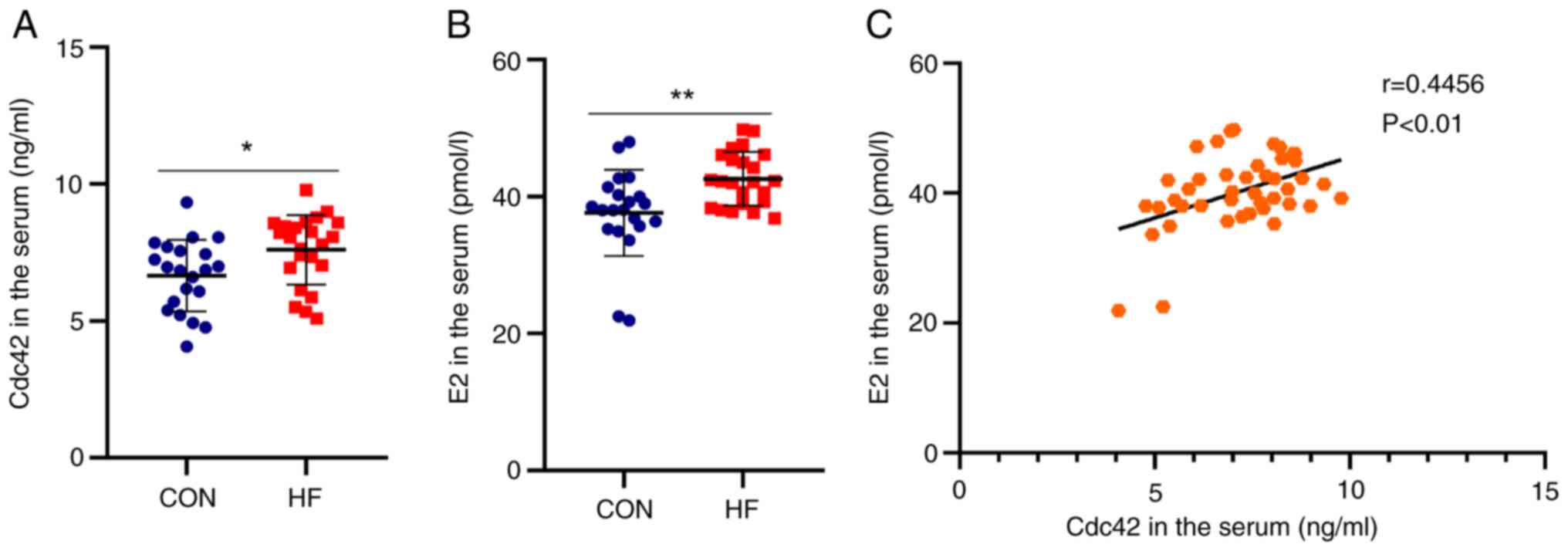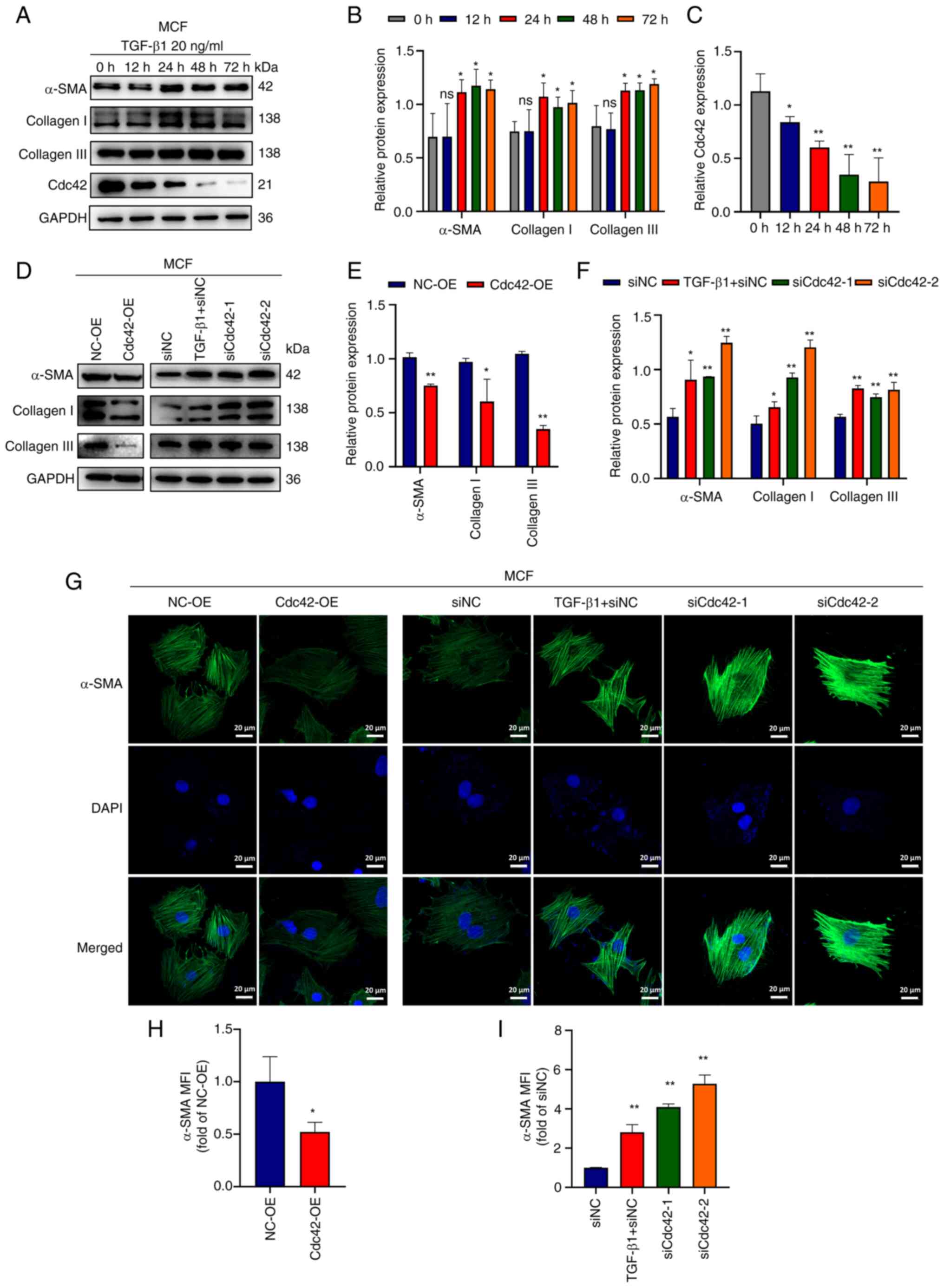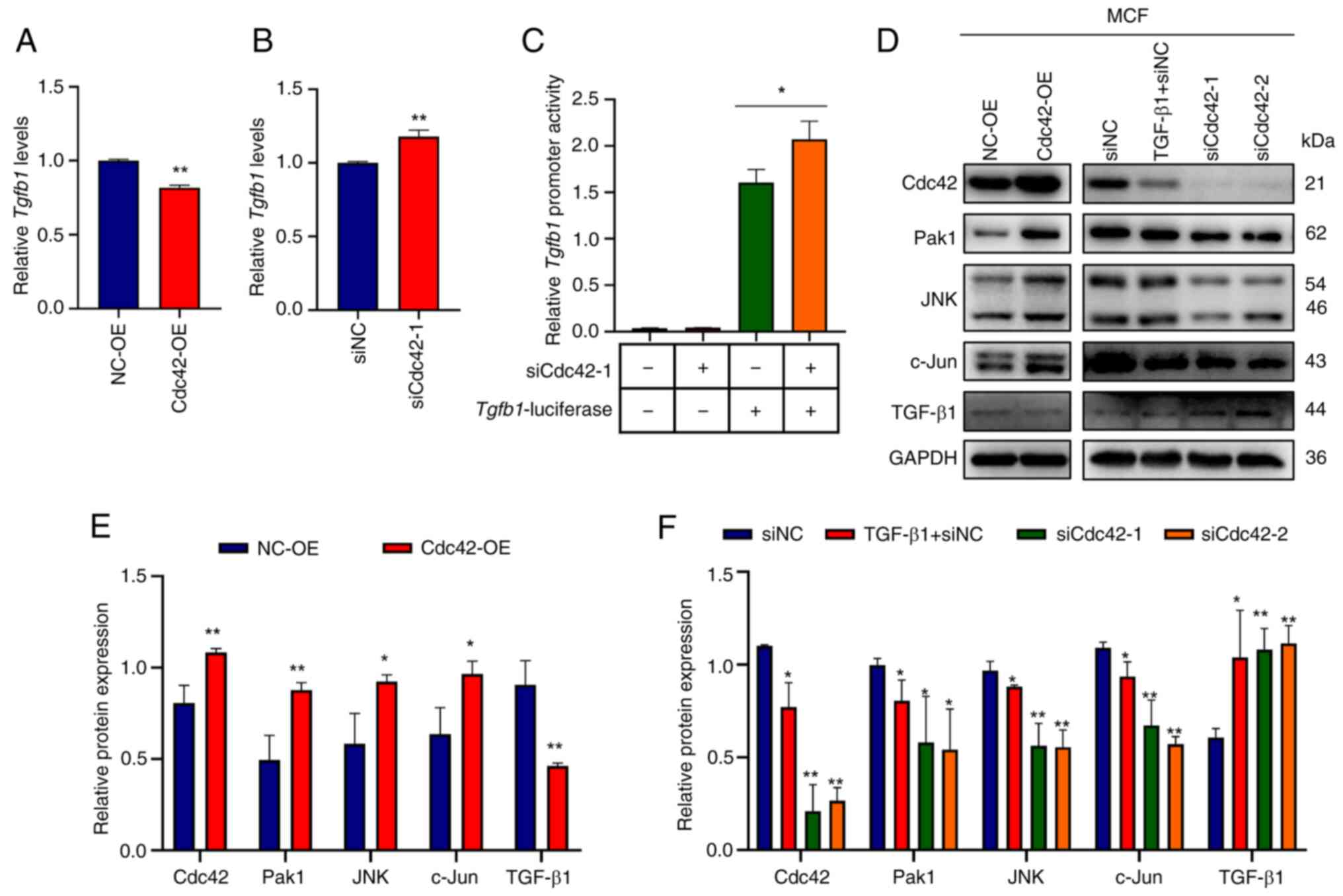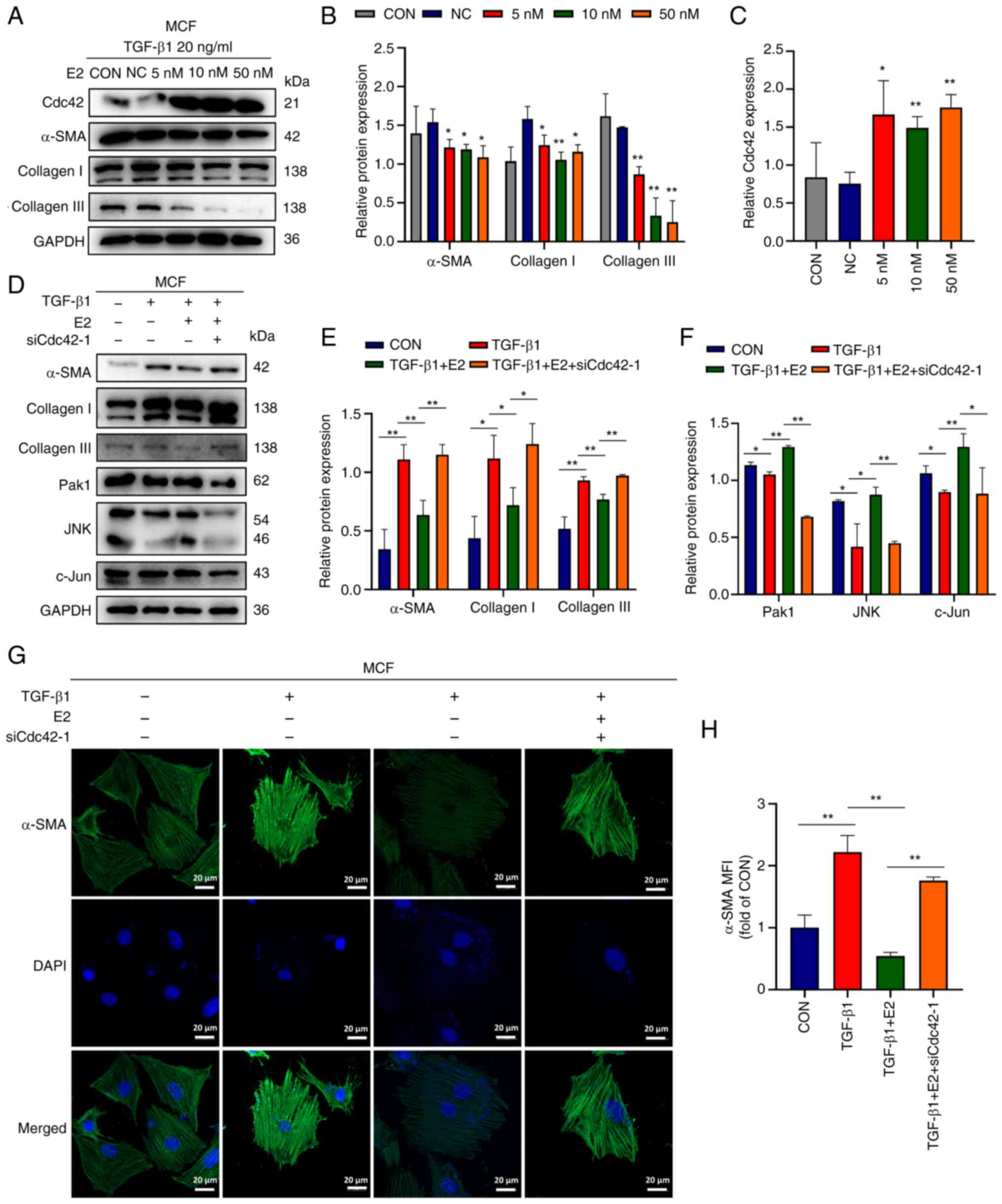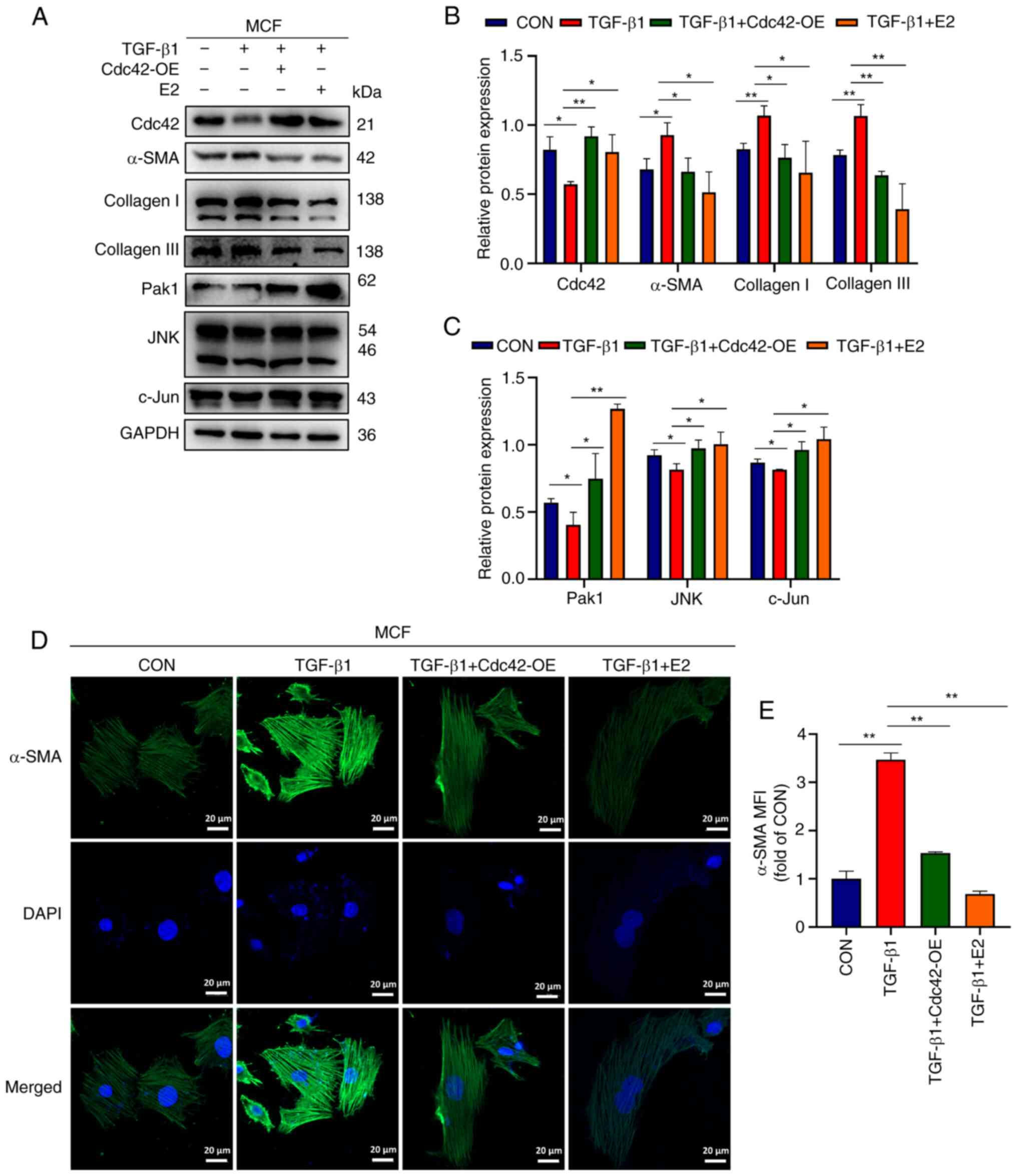|
1
|
Leask A: Getting to the heart of the
matter: New insights into cardiac fibrosis. Circ Res.
116:1269–1276. 2015. View Article : Google Scholar : PubMed/NCBI
|
|
2
|
Sabbatini AR and Kararigas G:
Menopause-related estrogen decrease and the pathogenesis of HFpEF:
JACC review topic of the week. J Am Coll Cardiol. 75:1074–1082.
2020. View Article : Google Scholar : PubMed/NCBI
|
|
3
|
Gyöngyösi M, Winkler J, Ramos I, Do QT,
Firat H, McDonald K, González A, Thum T, Díez J, Jaisser F, et al:
Myocardial fibrosis: Biomedical research from bench to bedside. Eur
J Heart Fail. 19:177–191. 2017. View
Article : Google Scholar : PubMed/NCBI
|
|
4
|
Tarbit E, Singh I, Peart JN and Rose'Meyer
RB: Biomarkers for the identification of cardiac fibroblast and
myofibroblast cells. Heart Fail Rev. 24:1–15. 2019. View Article : Google Scholar : PubMed/NCBI
|
|
5
|
Zhang YE: Non-smad signaling pathways of
the TGF-β family. Cold Spring Harb Perspect Biol. 9:a0221292017.
View Article : Google Scholar : PubMed/NCBI
|
|
6
|
Weber KT, Sun Y, Bhattacharya SK, Ahokas
RA and Gerling IC: Myofibroblast-mediated mechanisms of
pathological remodelling of the heart. Nat Rev Cardiol. 10:15–26.
2013. View Article : Google Scholar : PubMed/NCBI
|
|
7
|
Morine KJ, Qiao X, York S, Natov PS,
Paruchuri V, Zhang Y, Aronovitz MJ, Karas RH and Kapur NK: Bone
morphogenetic protein 9 reduces cardiac fibrosis and improves
cardiac function in heart failure. Circulation. 138:513–526. 2018.
View Article : Google Scholar : PubMed/NCBI
|
|
8
|
Xu C, Zhou Q, Liu L, Liu P, Pei G, Zeng R,
Han M and Xu G: Cdc42-interacting protein 4 represses E-cadherin
expression by promoting beta-catenin translocation to the nucleus
in murine renal tubular epithelial cells. Int J Mol Sci.
16:19170–19183. 2015. View Article : Google Scholar : PubMed/NCBI
|
|
9
|
Ge J, Burnier L, Adamopoulou M, Kwa MQ,
Schaks M, Rottner K and Brakebusch C: RhoA, Rac1, and Cdc42
differentially regulate αSMA and collagen I expression in
mesenchymal stem cells. J Biol Chem. 293:9358–9369. 2018.
View Article : Google Scholar : PubMed/NCBI
|
|
10
|
Yoshida Y, Yamada A, Akimoto Y, Abe K,
Matsubara S, Hayakawa J, Tanaka J, Kinoshita M, Kato T, Ogata H, et
al: Cdc42 has important roles in postnatal angiogenesis and
vasculature formation. Dev Biol. 477:64–69. 2021. View Article : Google Scholar : PubMed/NCBI
|
|
11
|
Ling L, Bai J, Gu R, Jiang C, Li R, Kang
L, Ferro A and Xu B: Sca-1+ cardiac progenitor cell therapy with
cells overexpressing integrin-linked kinase improves cardiac
function after myocardial infarction. Transplantation.
95:1187–1196. 2013. View Article : Google Scholar : PubMed/NCBI
|
|
12
|
Maillet M, Lynch JM, Sanna B, York AJ,
Zheng Y and Molkentin JD: Cdc42 is an antihypertrophic molecular
switch in the mouse heart. J Clin Invest. 119:3079–3088. 2009.
View Article : Google Scholar : PubMed/NCBI
|
|
13
|
Raut SK, Kumar A, Singh GB, Nahar U,
Sharma V, Mittal A, Sharma R and Khullar M: miR-30c mediates
upregulation of Cdc42 and Pak1 in diabetic cardiomyopathy.
Cardiovasc Ther. 33:89–97. 2015. View Article : Google Scholar : PubMed/NCBI
|
|
14
|
Zhou Y, Xie Y, Li T, Zhang P, Chen T, Fan
Z and Tan X: P21-activated kinase 1 mediates angiotensin II-induced
differentiation of human atrial fibroblasts via the JNK/c-Jun
pathway. Mol Med Rep. 23:2072021. View Article : Google Scholar : PubMed/NCBI
|
|
15
|
Khan SS, Beach LB and Yancy CW: Sex-based
differences in heart failure: JACC focus seminar 7/7. J Am Coll
Cardiol. 79:1530–1541. 2022. View Article : Google Scholar : PubMed/NCBI
|
|
16
|
Aryan L, Younessi D, Zargari M, Banerjee
S, Agopian J, Rahman S, Borna R, Ruffenach G, Umar S and Eghbali M:
The role of estrogen receptors in cardiovascular disease. Int J Mol
Sci. 21:43142020. View Article : Google Scholar : PubMed/NCBI
|
|
17
|
Yun SP, Ryu JM, Kim MO, Park JH and Han
HJ: Rapid actions of plasma membrane estrogen receptors regulate
motility of mouse embryonic stem cells through a
profilin-1/cofilin-1-directed kinase signaling pathway. Mol
Endocrinol. 26:1291–1303. 2012. View Article : Google Scholar : PubMed/NCBI
|
|
18
|
Sukocheva O, Wadham C and Xia P: Estrogen
defines the dynamics and destination of transactivated EGF receptor
in breast cancer cells: Role of S1P3 receptor and Cdc42. Exp Cell
Res. 319:455–465. 2013. View Article : Google Scholar : PubMed/NCBI
|
|
19
|
Heart Failure Group of Chinese Society of
Cardiology of Chinese Medical Association, Chinese Heart Failure
Association of Chinese Medical Doctor Association and Editorial
Board of Chinese Journal of Cardiology, . Chinese guidelines for
the diagnosis and treatment of heart failure 2018. Zhonghua Xin Xue
Guan Bing Za Zhi. 46:760–789. 2018.(In Chinese). PubMed/NCBI
|
|
20
|
Ventura JJ, Kennedy NJ, Flavell RA and
Davis RJ: JNK regulates autocrine expression of TGF-beta1. Mol
Cell. 15:269–278. 2004. View Article : Google Scholar : PubMed/NCBI
|
|
21
|
Livak KJ and Schmittgen TD: Analysis of
relative gene expression data using real-time quantitative PCR and
the 2(−Delta Delta C(T)) method. Methods. 25:402–408. 2001.
View Article : Google Scholar : PubMed/NCBI
|
|
22
|
Lu ZZ, Sun C, Zhang X, Peng Y, Wang Y,
Zeng Y, Zhu N, Yuan Y and Zeng MS: Neuropilin 1 is an entry
receptor for KSHV infection of mesenchymal stem cell through
TGFBR1/2-mediated macropinocytosis. Sci Adv. 9:eadg17782023.
View Article : Google Scholar : PubMed/NCBI
|
|
23
|
Friesland A, Zhao Y, Chen Y-H, Wang L,
Zhou H and Lu Q: Small molecule targeting Cdc42-intersectin
interaction disrupts Golgi organization and suppresses cell
motility. Proc Natl Acad Sci USA. 110:1261–1266. 2013. View Article : Google Scholar : PubMed/NCBI
|
|
24
|
Bai S, Zeng R, Zhou Q, Liao W, Zhang Y, Xu
C, Han M, Pei G, Liu L, Liu X, et al: Cdc42-interacting protein-4
promotes TGF-Β1-induced epithelial-mesenchymal transition and
extracellular matrix deposition in renal proximal tubular
epithelial cells. Int J Biol Sci. 8:859–869. 2012. View Article : Google Scholar : PubMed/NCBI
|
|
25
|
Li L, Xu L, Wen S, Yang Y, Li X and Fan Q:
The effect of lncRNA-ARAP1-AS2/ARAP1 on high glucose-induced
cytoskeleton rearrangement and epithelial-mesenchymal transition in
human renal tubular epithelial cells. J Cell Physiol.
235:5787–5795. 2020. View Article : Google Scholar : PubMed/NCBI
|
|
26
|
Wu H, Yu Y, Huang H, Hu Y, Fu S, Wang Z,
Shi M, Zhao X, Yuan J, Li J, et al: Progressive pulmonary fibrosis
is caused by elevated mechanical tension on alveolar stem cells.
Cell. 180:107–121.e17. 2020. View Article : Google Scholar : PubMed/NCBI
|
|
27
|
Yokokawa T, Misaka T, Kimishima Y, Shimizu
T, Kaneshiro T and Takeishi Y: Clinical significance of circulating
cardiomyocyte-specific cell-free DNA in patients with heart
failure: A proof-of-concept study. Can J Cardiol. 36:931–935. 2020.
View Article : Google Scholar : PubMed/NCBI
|
|
28
|
Feng Q, Guo J, Hou A, Guo Z, Zhang Y, Guo
Y, Liu S, Cheng Z, Sun L, Meng L and Han S: The clinical role of
serum cell division control 42 in coronary heart disease. Scand J
Clin Lab Invest. 83:45–50. 2023. View Article : Google Scholar : PubMed/NCBI
|
|
29
|
Yan H, Yang W, Zhou F, Pan Q, Allred K,
Allred C, Sun Y, Threadgill D, Dostal D, Tong C and Guo S: Estrogen
protects cardiac function and energy metabolism in dilated
cardiomyopathy induced by loss of cardiac IRS1 and IRS2. Circ Heart
Fail. 15:e0087582022. View Article : Google Scholar : PubMed/NCBI
|
|
30
|
Hajializadeh Z and Khaksari M: The
protective effects of 17-β estradiol and SIRT1 against cardiac
hypertrophy: A review. Heart Fail Rev. 27:725–738. 2022. View Article : Google Scholar : PubMed/NCBI
|
|
31
|
Meyer MR and Barton M: Estrogens and
coronary artery disease: New clinical perspectives. Adv Pharmacol.
77:307–360. 2016. View Article : Google Scholar : PubMed/NCBI
|
|
32
|
Fernandes RD, Hall A, Ferguson M,
Lorenzen-Schmidt I, Balasubramaniam V and Pyle WG: Cardiac changes
during the peri-menopausal period in a VCD-induced murine model of
ovarian failure. Acta Physiol (Oxf). 227:e132902019. View Article : Google Scholar : PubMed/NCBI
|
|
33
|
Pedram A, Razandi M, O'Mahony F, Lubahn D
and Levin ER: Estrogen receptor-beta prevents cardiac fibrosis. Mol
Endocrinol. 24:2152–2165. 2010. View Article : Google Scholar : PubMed/NCBI
|
|
34
|
Hess RA and Cooke PS: Estrogen in the
male: A historical perspective. Biol Reprod. 99:27–44. 2018.
View Article : Google Scholar : PubMed/NCBI
|
|
35
|
Jankowska EA, Rozentryt P, Ponikowska B,
Hartmann O, Kustrzycka-Kratochwil D, Reczuch K, Nowak J,
Borodulin-Nadzieja L, Polonski L, Banasiak W, et al: Circulating
estradiol and mortality in men with systolic chronic heart failure.
JAMA. 301:1892–1901. 2009. View Article : Google Scholar : PubMed/NCBI
|
|
36
|
Manson JE, Chlebowski RT, Stefanick ML,
Aragaki AK, Rossouw JE, Prentice RL, Anderson G, Howard BV, Thomson
CA, LaCroix AZ, et al: Menopausal hormone therapy and health
outcomes during the intervention and extended poststopping phases
of the women's health initiative randomized trials. JAMA.
310:1353–1368. 2013. View Article : Google Scholar : PubMed/NCBI
|
|
37
|
O'Meara E, Clayton T, McEntegart MB,
McMurray JJ, Piña IL, Granger CB, Ostergren J, Michelson EL,
Solomon SD, Pocock S, et al: Sex differences in clinical
characteristics and prognosis in a broad spectrum of patients with
heart failure: Results of the Candesartan in Heart failure:
Assessment of Reduction in Mortality and morbidity (CHARM) program.
Circulation. 115:3111–3120. 2007. View Article : Google Scholar : PubMed/NCBI
|
|
38
|
Yang XP and Reckelhoff JF: Estrogen,
hormonal replacement therapy and cardiovascular disease. Curr Opin
Nephrol Hypertens. 20:133–138. 2011. View Article : Google Scholar : PubMed/NCBI
|
|
39
|
Iorga A, Cunningham CM, Moazeni S,
Ruffenach G, Umar S and Eghbali M: The protective role of estrogen
and estrogen receptors in cardiovascular disease and the
controversial use of estrogen therapy. Biol Sex Differ. 8:332017.
View Article : Google Scholar : PubMed/NCBI
|















